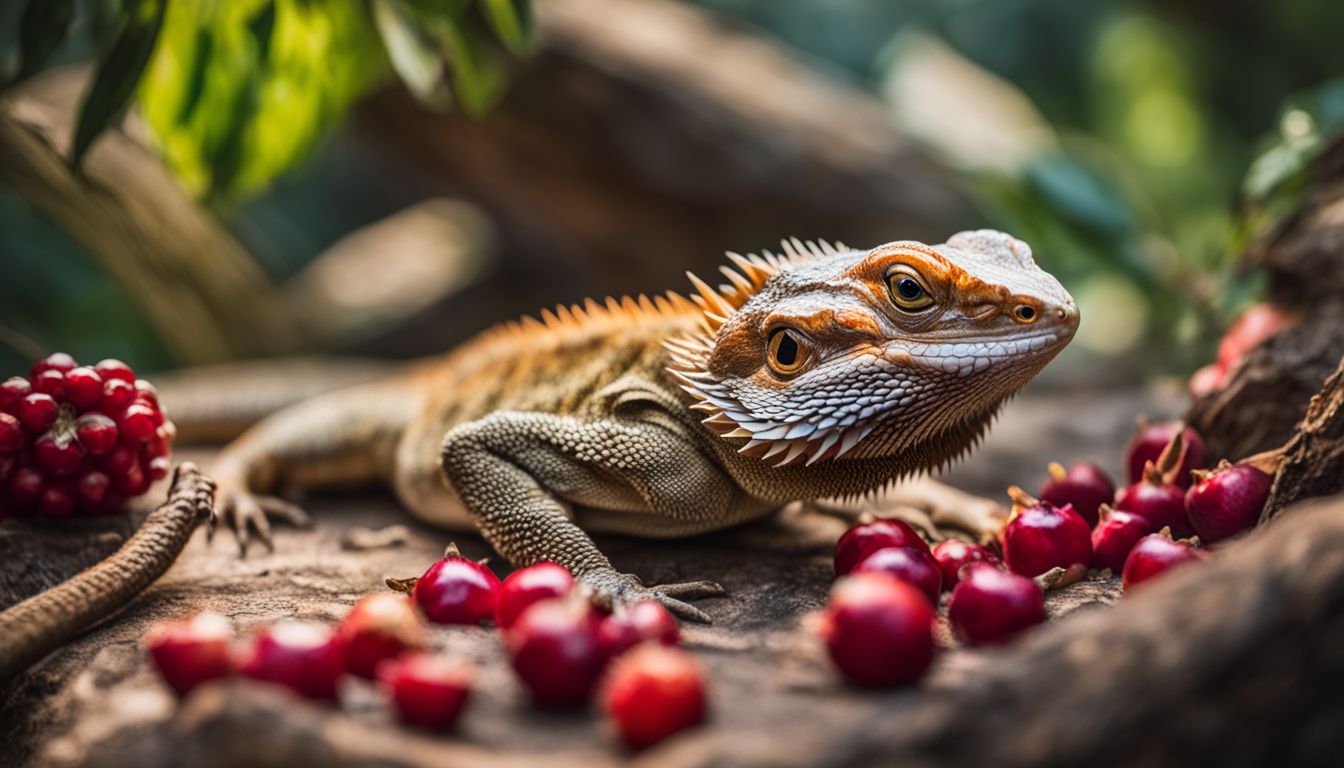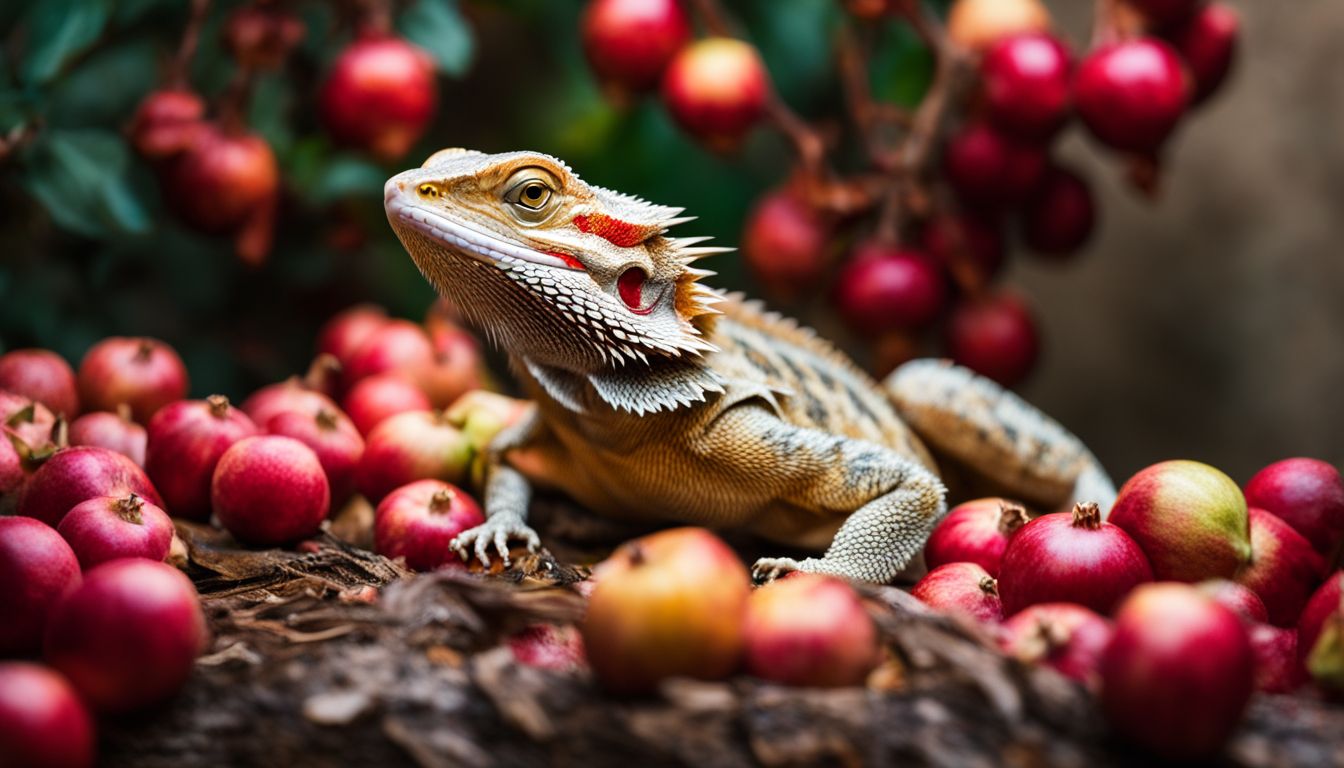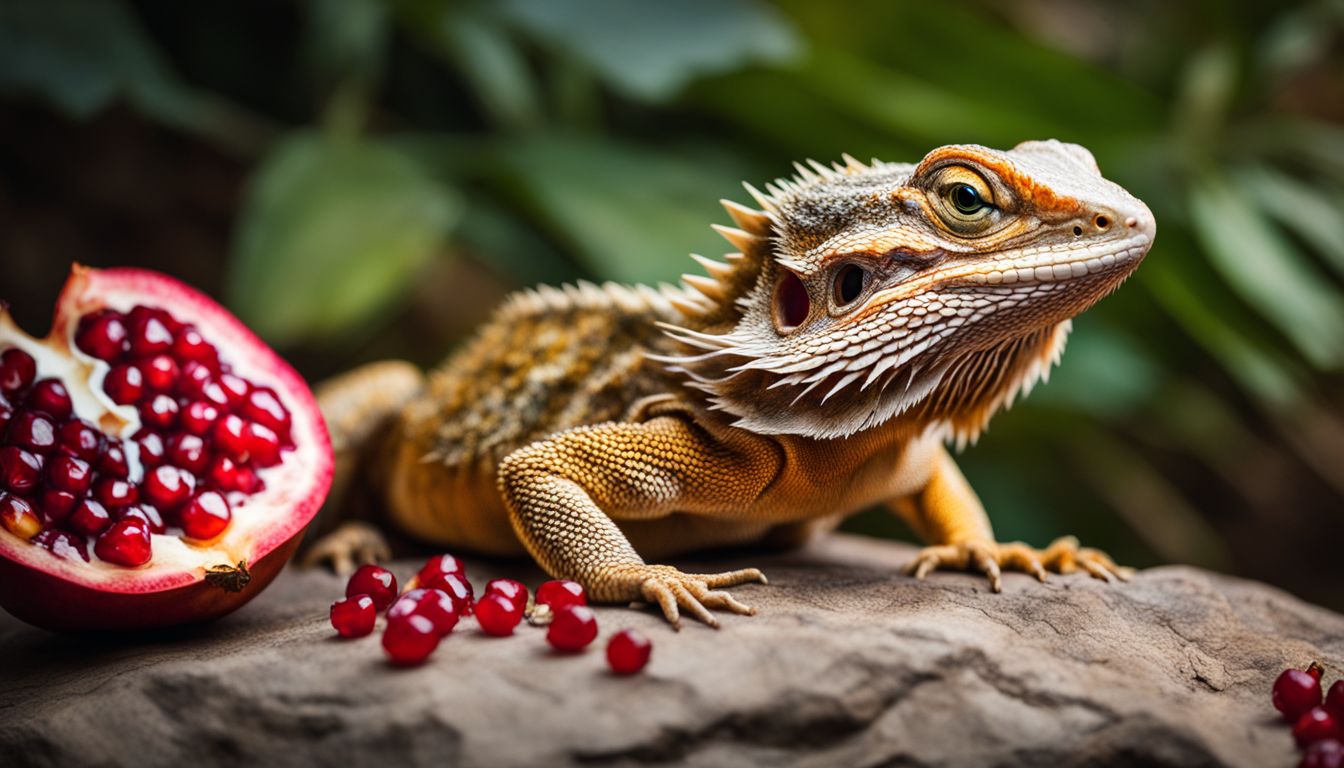Are you wondering if your bearded dragon can enjoy the sweet taste of pomegranate? You’re not alone. Many owners are curious about safe fruits for their pets. This article will guide you through the benefits and risks of feeding pomegranates to bearded dragons, providing you with practical advice on how to do it right.
Stay tuned!
Health Benefits of Pomegranates for Bearded Dragons

Transitioning from whether bearded dragons can eat pomegranates, it’s also crucial to understand how these fruits benefit their health. Pomegranates pack a punch with vitamins and antioxidants that are essential for your reptile’s well-being.
These nutrients aid in fighting off diseases by strengthening the immune system. They play a significant role in promoting healthy skin and scales, which is vital for these creatures.
Feeding pomegranate seeds to your bearded dragon offers them minerals and vitamins without the risk of toxicity. This nutritious fruit supports overall health by supplying vitamin C, K, and other beneficial compounds.
It helps in maintaining a balanced diet for your pet, ensuring they get a wide range of dietary needs met through natural sources like antioxidant-rich fruits.
Potential Risks of Feeding Pomegranates to Bearded Dragons

Feeding pomegranates to bearded dragons can pose risks due to their high sugar content. The poor calcium-to-phosphorus ratio in pomegranates may also lead to health issues for these reptiles.
High Sugar Content
Pomegranates pack about 12 grams of sugar in just half a cup of seeds. For bearded dragons, this high sugar content is a red flag. Their bodies aren’t built to handle excessive sugar intake, which can lead them down a path toward obesity and other serious health issues.
Consuming too much sugar might also lead to fatty liver, a condition that’s as unpleasant as it sounds.
Bearded dragons need a diet that keeps high-sugar foods to a minimum. Introducing too many sweet fruits like pomegranate into their meals could invite obesity and related illnesses.
These reptiles thrive on balanced nutrition—where sugary treats are the exception, not the rule—to stay healthy and happy.
Poor Calcium-to-Phosphorus Ratio
Bearded dragons need a diet with more calcium than phosphorus. Unfortunately, pomegranates throw off this balance by having over three times as much phosphorus as calcium. This can lead to a calcium deficiency which is harmful to your bearded dragon’s health.
Feeding too many pomegranates might make it hard for bearded dragons to get enough calcium. Their bodies really need foods low in phosphorus and oxalates. Keeping an eye on the calcium-to-phosphorus ratio helps ensure they stay healthy and happy.
Can Bearded Dragons Eat Pomegranate Seeds?
Pomegranate seeds are safe for bearded dragons and can offer vitamins, minerals, and antioxidants in small amounts. They should only be given occasionally as a rare treat due to their high sugar content of about 12 grams per half cup.
Additionally, pomegranates contain moderate levels of oxalates that could potentially harm bearded dragons over time. When feeding pomegranate to your pet, it is crucial to separate the arils from the seeds and give them sparingly.
Remember, moderation is key when offering pomegranates to your bearded dragon due to their sugar content and moderate oxalate levels. These seeds can provide some natural nutrients but should not become a regular part of your pet’s diet.
How Often and How to Feed Pomegranates to Bearded Dragons
Pomegranates should be fed sparingly to bearded dragons due to their moderate oxalate levels and high sugar content. Here’s how to safely feed pomegranates to your bearded dragon:
- Offer pomegranate as an occasional treat, no more than once a week.
- Always remove the seeds from the arils before feeding them to your dragon.
- Serve small pieces of pomegranate to avoid overfeeding and monitor their response.
- Rotate pomegranates with other safe fruits to ensure a varied diet.
- Be mindful of their calcium intake when offering pomegranates, especially if they have underlying health issues related to calcium metabolism.
Alternatives to Pomegranates for Bearded Dragons
If you’re considering alternatives to feeding pomegranates to your bearded dragon, here are some options that provide nutritional benefits and are suitable for their diet:
- Blueberries – These are low in sugar and high in antioxidants, making them a healthy treat for your bearded dragon.
- Papayas – Rich in vitamins and minerals, papayas can offer a nutritious alternative to pomegranates for your pet.
- Kiwi – High in vitamin C and fiber, kiwis make a tasty and beneficial addition to your bearded dragon’s diet.
- Mangoes – Although they contain natural sugars, mangoes can be fed occasionally due to their rich vitamin content.
- Raspberries – With relatively low sugar content and high fiber, raspberries can be a good alternative treat for your bearded dragon.
Understanding Bearded Dragon Behavior
Bearded dragons have some common behaviors that can indicate their health and well-being. They might puff themselves up or change color when feeling threatened. Also, they love to bask under a heat lamp, and if they’re waving their arms, it could be a sign of submission or a way of communicating with other bearded dragons.
Be observant of any changes in eating habits, as sudden decreases in appetite can signal illness. Moreover, if your pet seems unusually lethargic or is displaying aggression, these could also be signs that something is not right.
Regularly monitoring their behavior will help you pick up on any potential issues early.
It’s important to remember that while some behaviors are normal for most bearded dragons, each dragon may have its own unique quirks. This means taking the time to understand what is typical for your specific pet and recognizing any deviations from that norm promptly.
Being attentive to these behavioral cues helps ensure the continued good health and happiness of your beardie friend!
Conclusion
Feeding pomegranate to bearded dragons requires cautious moderation due to its high sugar and phosphorus levels. While the seeds are safe, they should only be an occasional treat. Understanding their nutritional needs and offering suitable alternatives is vital for your reptile’s well-being.
To keep your bearded dragon healthy, a balanced diet with minimal oxalates is key. Always consult a reptile veterinarian for tailored dietary advice.
To learn more about bearded dragon behavior and why your pet might be exhibiting unusual activity, visit our detailed guide here.
FAQs
1. Can bearded dragons eat pomegranate seeds?
Bearded dragons can eat pomegranate seeds as an occasional treat, but they should be fed in moderation.
2. Is it safe for bearded dragons to consume pomegranate juice?
No, it is not recommended to feed pomegranate juice to bearded dragons due to its high sugar content and potential digestive issues.
3. How should I prepare pomegranate for my bearded dragon?
Remove the seeds from the white membrane before offering them to your pet; ensure that no pesticides or chemicals are present on the fruit.
4. Are there any health benefits of feeding pomegranate to a bearded dragon?
Pomegranates can provide essential nutrients like vitamin C and fiber, but they should only form a small part of their diet.
5. Can feeding too much pomegranate harm my bearded dragon’s health?
Excessive consumption of pomegranate can lead to stomach upset and diarrhea in bearded dragons; therefore, it should only be given occasionally.




